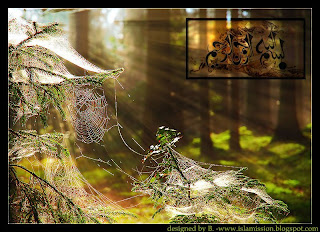House of
prayer in
Islam. A mosque is symbolically very important to
Muslims, and is a humble way for man to recreate pure divine presence on earth. But mosques are not built according to what is believed to be divine patterns, even if they are divinely guided, nor after very clear rules, except on some few points. It shall have a clear indication of the direction of
Mecca,
qibla (kible). The indication is in most mosques a
mihrab, a niche in the wall. A mosque shall have a roofed area in front of the
mihrab, and doors can be placed in the walls where the
mihrab is not.
Masjid (Mescit) is a word meaning 'place for prostration', and were used by the early
Muslims for houses of worship, even for other religions. Today the Arabic 'masjid', and the English 'mosque' are used exclusively for religious houses in
Islam.
History and Development
The first mosque is the one in
Mecca, meaning the area that surrounded the
Ka'ba, the most holy shrine. But the model of early mosques, was the courtyard of
Muhammed's house in
Madina, which was constructed in 622 AD. This was organized with a
qibla, first facing in the direction of Jerusalem. To the left of this
qibla, houses for
Muhammed's wives, were erected. There were three entrances to the courtyard. An area of the courtyard was roofed, and here
prayer was performed. After 1,5 years the
qibla was changed, so that it faced
Mecca.
This
Madina mosque had social, political, and judicial functions, as well as housing
Muhammad's family. The religious functions were mixed with other functions. Rules on
prayers seem to have not been shaped at the first period, since the prescriptions of the
Koran, came gradually in these years. Apart from the mosques of
Mecca and
Madina, one finds some few indications that there were other mosques in the time of
Muhammad.
Mosques soon grew into becoming more complex, and uniform, in their shape. A
minbar, the pulpit, from where the Friday
prayer is held, was placed next to the
mihrab. Within few years after the death of
Muhammad, mosques became such important symbols, that when
Muslim conquerors established themselves somewhere, a mosque was put up first, and then the military camp was built around it. This was inspired by the
Madina example, but in some principal cities,
Muslims constructed their mosque in the place that was the centre of other religions.
In the beginning of
Islam, tribes and sects in
Islam, often marked their independence or their purity, by putting up mosques of their own, or by defining a certain part of the mosque as their part. This pattern have changed up through history, but the situation today is not as tolerant as it might appear.
Muslims of all creeds are in theory free to enter all mosques, but in reality some mosques are considered inappropriate, and a traveling
Muslim will try to find a mosque which is used by people belonging to his own creed (
Sunnis,
Shi'is, and Kharijis are the main division points, while governmental dominated or Islamist dominated mosques, is a new and even delicate division point). But most major mosques, the so called jami (cami) are seen upon as neutral, and are used by all creeds.
Many mosques of the first centuries, were originally churches. Many of these conversions were against the will of the
Christians, but not all. In many regions,
Christianity lost its position, and churches turned into mosques over time, simply through
Muslims using the churches as the religious buildings they were, and in full respect of
Christianity.
Most mosques today in the Arab territories are closed to non-
Muslims, but this was a regulation that was developed through the first century of
Islam. There was an increase in the emphasis on the sanctity of the mosque, more and more elements of the mosque was regarded as sacred, and any mosque was commonly regarded as 'House of God'. In
Turkey any mosque is open to visitors, non-
Muslims can visit them as well.
The design of the mosques developed from very simple to complex structures, in short time. In the first mosques, erected in Hijaz, orientation was more important than of form. The development of the mosque as it is known now, lasted for a period of 80 years. The shape of mosques came in many cases from a mixture of the
architecture of conquered territories, and of the original patterns.
The addition of
minarets, the towers from where the callings are made, and absent in the early mosques, was inspired by religious buildings of other religions, where one believes that it was the churches of Syria, that were most important. The implementation of
minarets, were both for embellishment of the mosques, and for the functionality of the mosques, as calling for
prayer, ezan, from ground level, did not carry more than a few blocks. But for some time after the introduction of the
minarets, the ezan was still performed with the
muezzin walking the streets, while inviting for
prayer. The first
minaret came probably in 703, in Kariouan, Tunisia, almost 100 years after the
Madina mosque. But there are written material suggesting that
minarets were erected as early as 665 AD.
The addition of adornments to the mosques was strongly discussed, and many
Muslims opposed this process, and thought of it as a way of jeopardizing what was
Muslim, and they disliked letting Christian elements in. This reaction was not farfetched, as many architects of early mosques, were in fact
Christians.
Over time, many rooms were added to the mosque, rooms used by people of different social classes, people performing their professions in the mosque, travelers, sick, and old. Devout and ascetics lived often in the mosque, and even in the
minaret.
Other elements inside a mosque are: Dakka, a platform, from where the
muezzin calls for
prayer, after he has done this from the
minaret. Kursi, a desk and a seat, for the
Koran and for the reader. Reliquaries, where bodies, parts of bodies, or belongings of religious personalities are kept.
Carpets covering the floor of mosques. Lights, both candles and lamps, used for illumination, but not ritually. Incense, especially together with
festivals. Water in the courtyard, both for
ablutions, and for drinking.
Administration
In the old times or even today in some Arab countries the mosques have often been built by rulers, and the administration of the mosques have been financed by waqfs (vakif), endowments bringing in revenues. These waqfs were normally
agricultural land, often administered by the donator, or members of his family, and could in some cases have a location far away from the mosque it financed. There could be more than one waqf to each mosque, mosques with economical problems, did often seek for new donators.
While mosques officially have been under the rulers, direct control have been difficult, much because of the economical independence (through waqfs), as well as the mosque's strength among people. The main donator, and his family, were in many cases legally considered the owner of the mosque. In other cases it was the
qadi (kadi), the judge of Sharia, who acted as the main administrator, nazir, of the mosque. The power of the nazir was considerable, and the position of nazir have often given room for intense conflicts between individuals and groups.
The factual leader of alat in the mosques, was the ruler, who held the title
imam. Local rulers, had a parallel position, under the title ala salat. The position of khatib, is a result of the
imam being unable to perform the salat of Fridays, the khutba. The khatib could be a
qadi, and in larger mosques, several khatibs could be appointed.
Today in
Turkey most of the new mosques are built by the people living in the neighborhood (with donations), or in case of necessity, religious and charity organizations can build them as well.
Rules for Mosques
Mosques are centers of cities, or of neighborhoods in cities. This function does not always have to be structured, but can be connected to mentality, and the construction of a new mosque makes a centre emerge. Very few mosques lie in open areas, and very few mosques does not have shops and commercial activities in the streets around it. People's houses are often lying in a second "circle" outside the mosque and the shops. Other social functions have often been connected to mosques, schools, law courts,
hospitals, and lodging for travelers. This pattern is based upon the
Madina mosque, but is of less importance today, as city planning now often use Western models.
When entering the mosque, a person shall take off his shoes or sandals. Entering the mosque shall be done with the right foot first, while one utters blessings to
Muhammad and his family. Once inside the mosque, two rak'as shall be performed. A person inside the mosque shall talk softly, not loudly, so that he or she does not disturb people
praying. For the Friday
prayer, nice clothes and perfumes are recommended.
Women entering mosques, are not prevented through neither the
Koran nor the Sunna, but there are regulations on how a
woman in a mosque shall behave. Mosques can be segregated, either in time, or in space. But in some
Muslim countries,
women entering mosques have not been welcomed, and mosques can be closed to
women, either by local rules, or by habit. In
Turkey women can easily go into any mosque.
While the salat can be performed anywhere, it is considered more meritorious when performed in the mosque, i.e. together with other people. The Sunna states that salat in the mosque is 20 or 25 times more valuable than the one performed in the home.
The Friday
prayer or sermon, khutba (hutbe), is considered to be compulsory for all male
Muslims, but the regulations on khatib, and for the Friday mosques, jami (cami), developed over a long period, approximately two centuries. With the strong increase in jami's from the 9th century, the term 'masjid' was more and more used for small and insignificant mosques. For a period in early
Islam, sermons were delivered every day, by a qass, who recited and explained. But the institution of qass, never became widespread, and soon disintegrate, and was condemned, and did only continue in
SufismAuthor : Burak Sansal
















